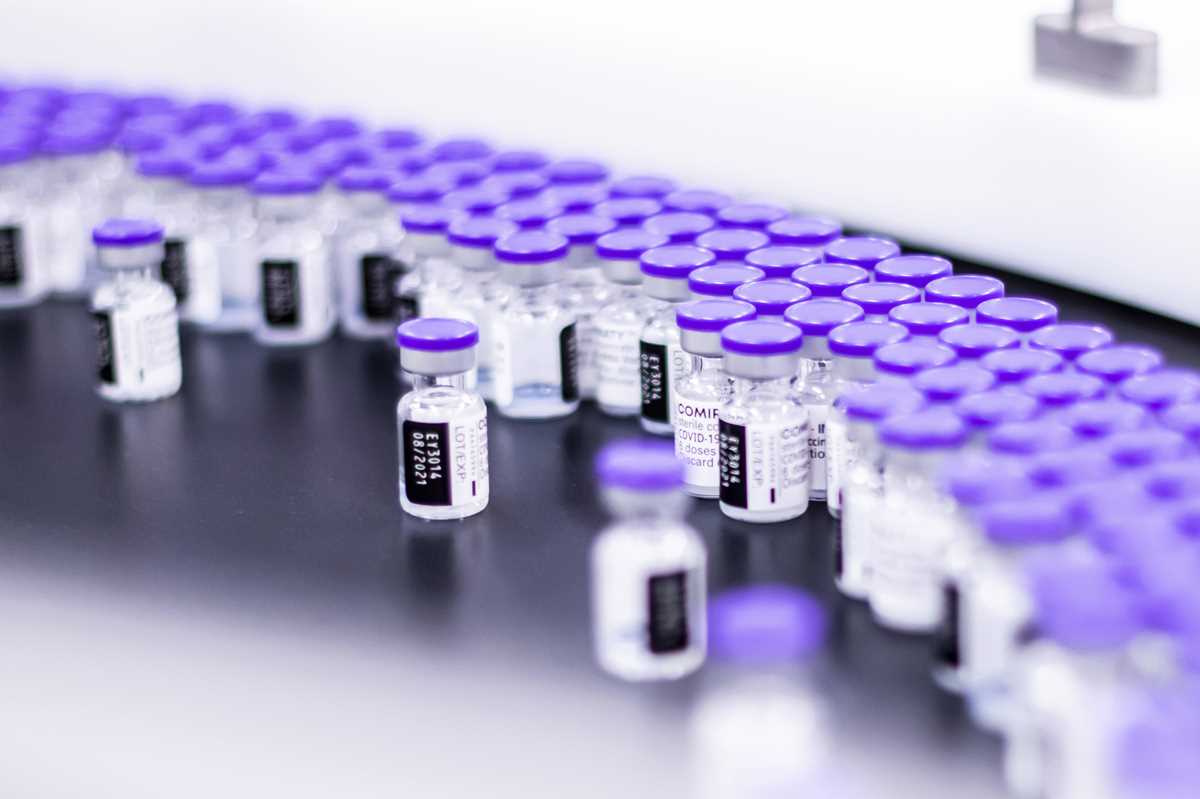 In this March 2021 photo provided by Pfizer, vials of the Pfizer-BioNTech COVID-19 vaccine are prepared for packaging at the company’s facility in Puurs, Belgium. Pfizer is about to seek U.S. authorization for a third dose of its COVID-19 vaccine, saying Thursday, July 8, 2021, that another shot within 12 months could dramatically boost immunity and maybe help ward off the latest worrisome coronavirus mutant. (Pfizer via AP)
In this March 2021 photo provided by Pfizer, vials of the Pfizer-BioNTech COVID-19 vaccine are prepared for packaging at the company’s facility in Puurs, Belgium. Pfizer is about to seek U.S. authorization for a third dose of its COVID-19 vaccine, saying Thursday, July 8, 2021, that another shot within 12 months could dramatically boost immunity and maybe help ward off the latest worrisome coronavirus mutant. (Pfizer via AP)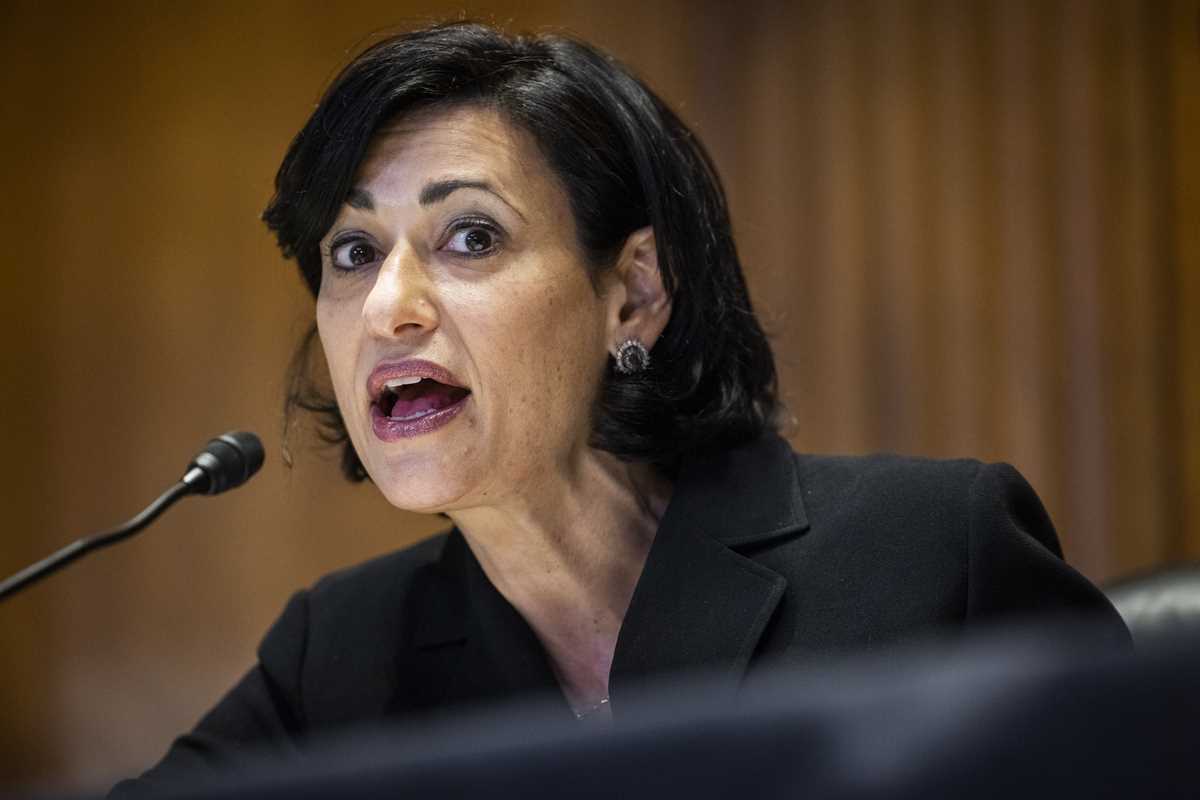 In this May 19, 2021 file photo, Centers for Disease Control and Prevention Director Dr. Rochelle Walensky testifies during a Senate Appropriations Subcommittee hearing on Capitol Hill in Washington. Hospitals trying to catch up on surgeries and other procedures that were put on hold amid the coronavirus pandemic are now finding themselves facing a delta-variant driven influx of patients. Walensky said Friday, July 16, that nearly all hospital admissions and deaths were among the unvaccinated. (Jim Lo Scalzo/Pool via AP)
In this May 19, 2021 file photo, Centers for Disease Control and Prevention Director Dr. Rochelle Walensky testifies during a Senate Appropriations Subcommittee hearing on Capitol Hill in Washington. Hospitals trying to catch up on surgeries and other procedures that were put on hold amid the coronavirus pandemic are now finding themselves facing a delta-variant driven influx of patients. Walensky said Friday, July 16, that nearly all hospital admissions and deaths were among the unvaccinated. (Jim Lo Scalzo/Pool via AP)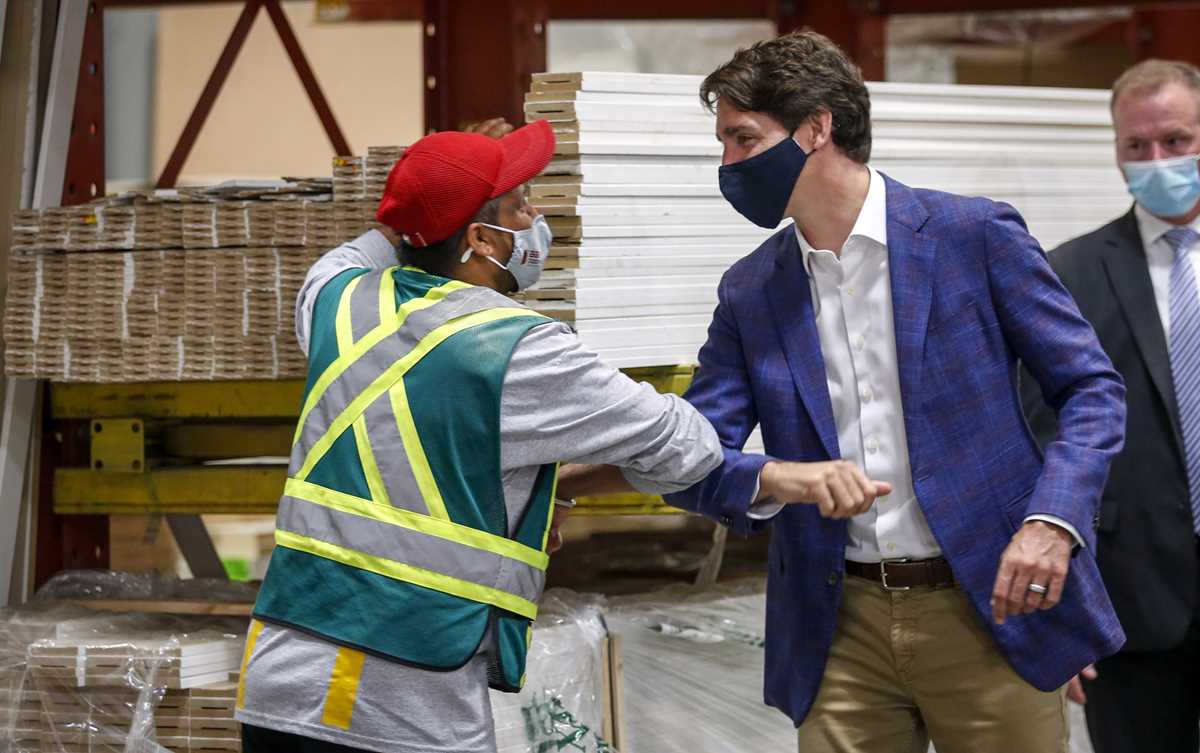 Canada Prime Minister Justin Trudeau elbow bumps elbows with an employee as he tours the AAA Door company in Calgary, Alberta, Wednesday, July 7, 2021. (Jeff McIntosh/The Canadian Press via AP)
Canada Prime Minister Justin Trudeau elbow bumps elbows with an employee as he tours the AAA Door company in Calgary, Alberta, Wednesday, July 7, 2021. (Jeff McIntosh/The Canadian Press via AP)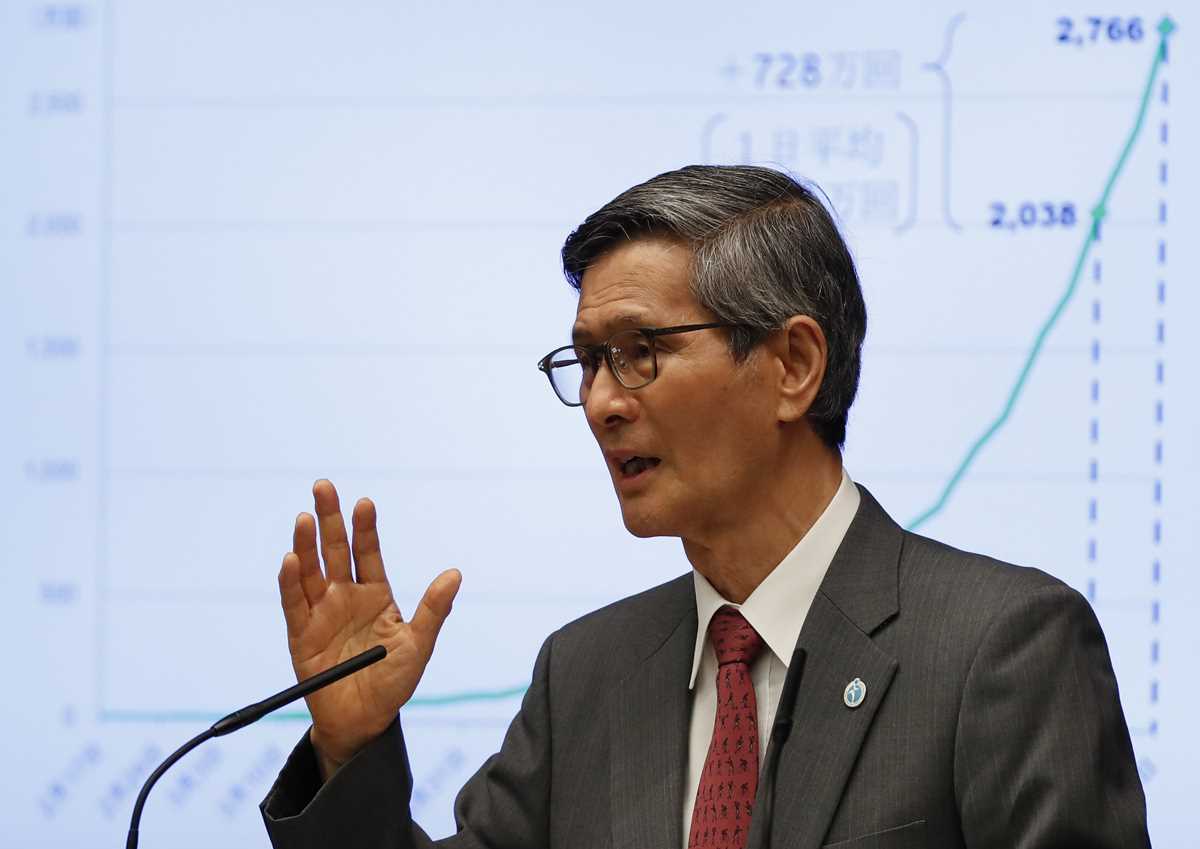 President of the Japan Community Health Care Organization Shigeru Omi attends a joint news conference with Japan's Prime Minister Yoshihide Suga (not in picture) on Japan's response to the coronavirus outbreak at Suga's official residence in Tokyo, Thursday, June 17, 2021. (Issei Kato/Pool Photo via AP)
President of the Japan Community Health Care Organization Shigeru Omi attends a joint news conference with Japan's Prime Minister Yoshihide Suga (not in picture) on Japan's response to the coronavirus outbreak at Suga's official residence in Tokyo, Thursday, June 17, 2021. (Issei Kato/Pool Photo via AP)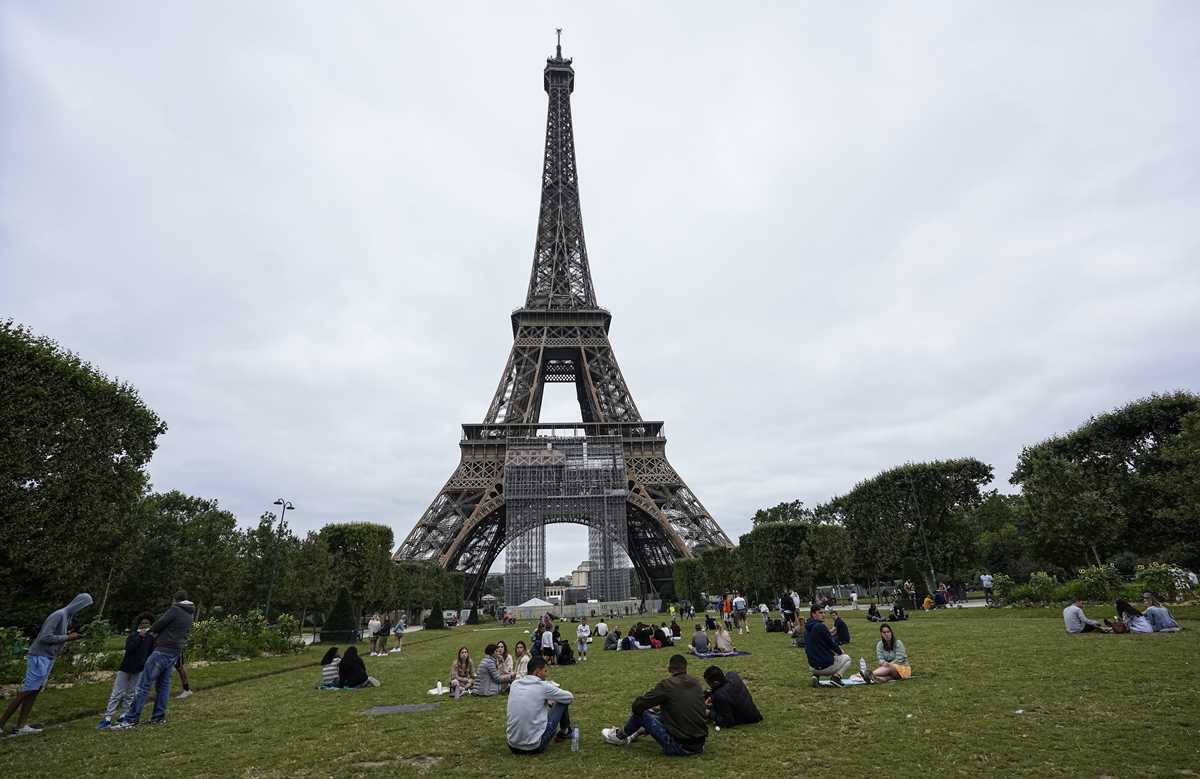 People relax at the Champ-de-Mars garden next to the Eiffel Tower in Paris, Friday, July 16, 2021. The Eiffel Tower is reopening Friday for the first time in nine months, just as France faces new virus rules aimed at taming the fast-spreading delta variant. The "Iron Lady" was ordered shut in October as France battled its second surge of the virus. (AP Photo/Michel Euler)
People relax at the Champ-de-Mars garden next to the Eiffel Tower in Paris, Friday, July 16, 2021. The Eiffel Tower is reopening Friday for the first time in nine months, just as France faces new virus rules aimed at taming the fast-spreading delta variant. The "Iron Lady" was ordered shut in October as France battled its second surge of the virus. (AP Photo/Michel Euler)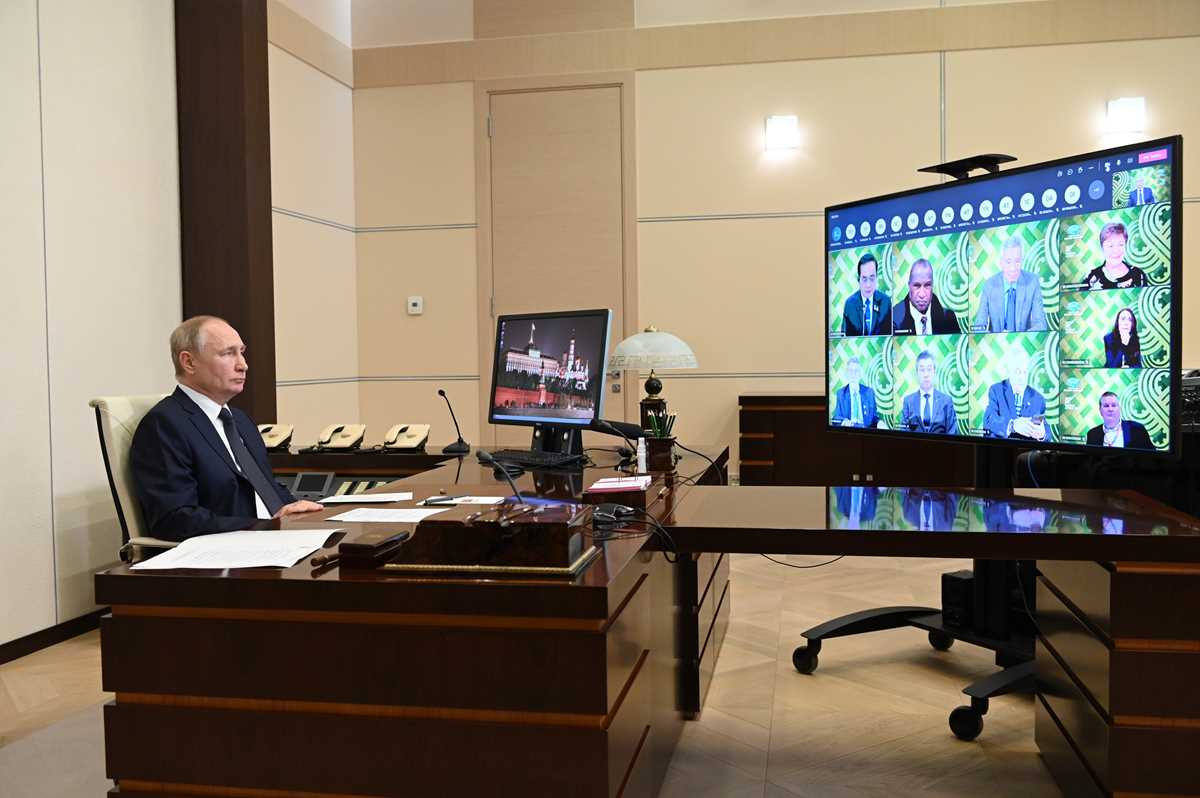 Russian President Vladimir Putin delivers a video statement to participants of special meeting of APEC leaders at the Novo-Ogaryovo residence outside Moscow, Russia, Friday, July 16, 2021. (Alexei Nikolsky, Sputnik, Kremlin Pool Photo via AP)
Russian President Vladimir Putin delivers a video statement to participants of special meeting of APEC leaders at the Novo-Ogaryovo residence outside Moscow, Russia, Friday, July 16, 2021. (Alexei Nikolsky, Sputnik, Kremlin Pool Photo via AP)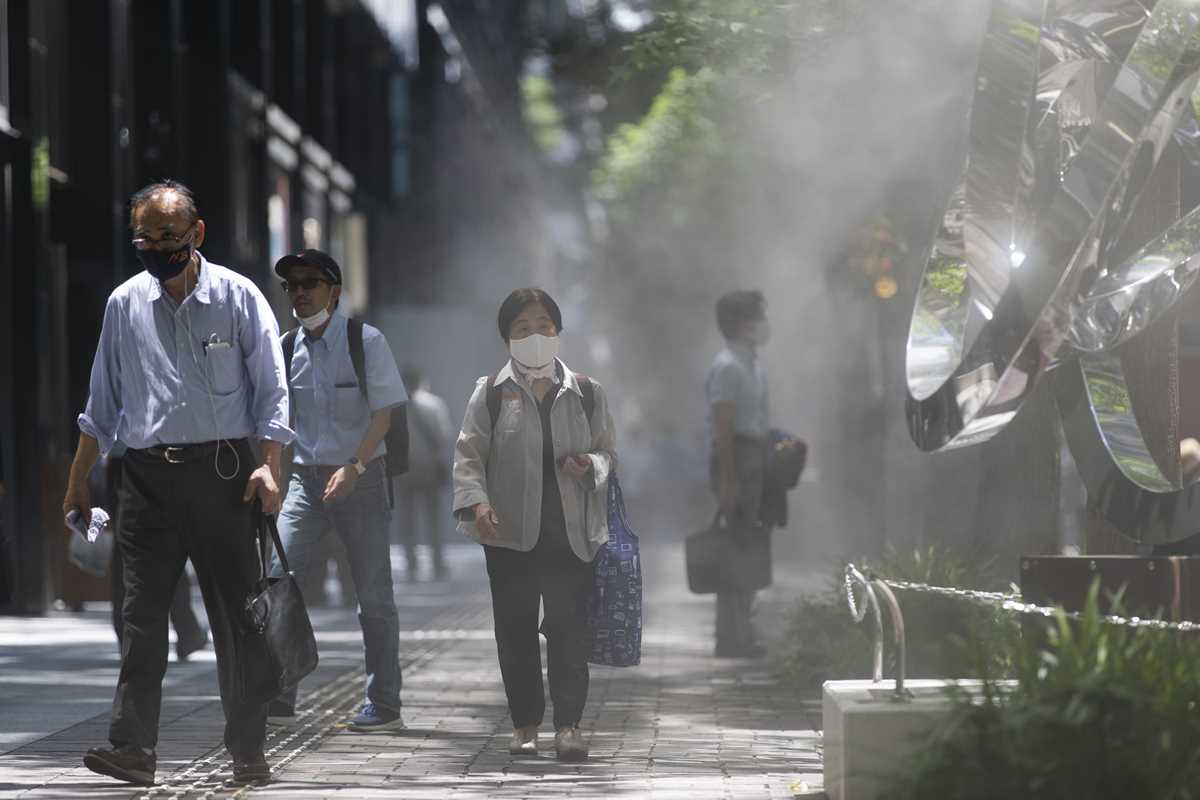 People wearing face masks to help curb the spread of the coronavirus walk on a sidewalk with a misting service in Tokyo Friday, July 16, 2021. (AP Photo/Hiro Komae)
People wearing face masks to help curb the spread of the coronavirus walk on a sidewalk with a misting service in Tokyo Friday, July 16, 2021. (AP Photo/Hiro Komae)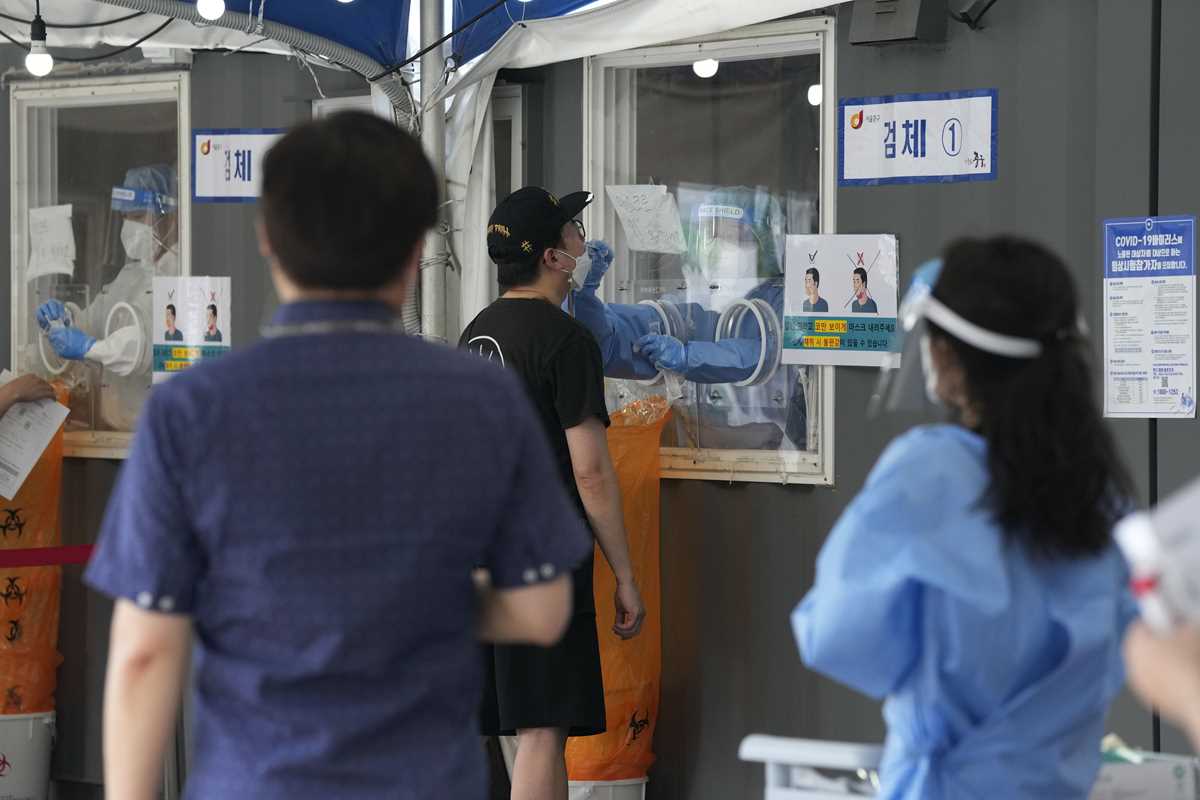 A medical worker in a booth takes a nasal sample from a man during a coronavirus testing at a makeshift testing site in Seoul, South Korea, Friday, July 16, 2021. South Korean officials are pushing for tightened pandemic restrictions beyond the hard-hit capital area as they wrestle with a record-breaking surge in coronavirus cases. (AP Photo/Ahn Young-joon)
A medical worker in a booth takes a nasal sample from a man during a coronavirus testing at a makeshift testing site in Seoul, South Korea, Friday, July 16, 2021. South Korean officials are pushing for tightened pandemic restrictions beyond the hard-hit capital area as they wrestle with a record-breaking surge in coronavirus cases. (AP Photo/Ahn Young-joon)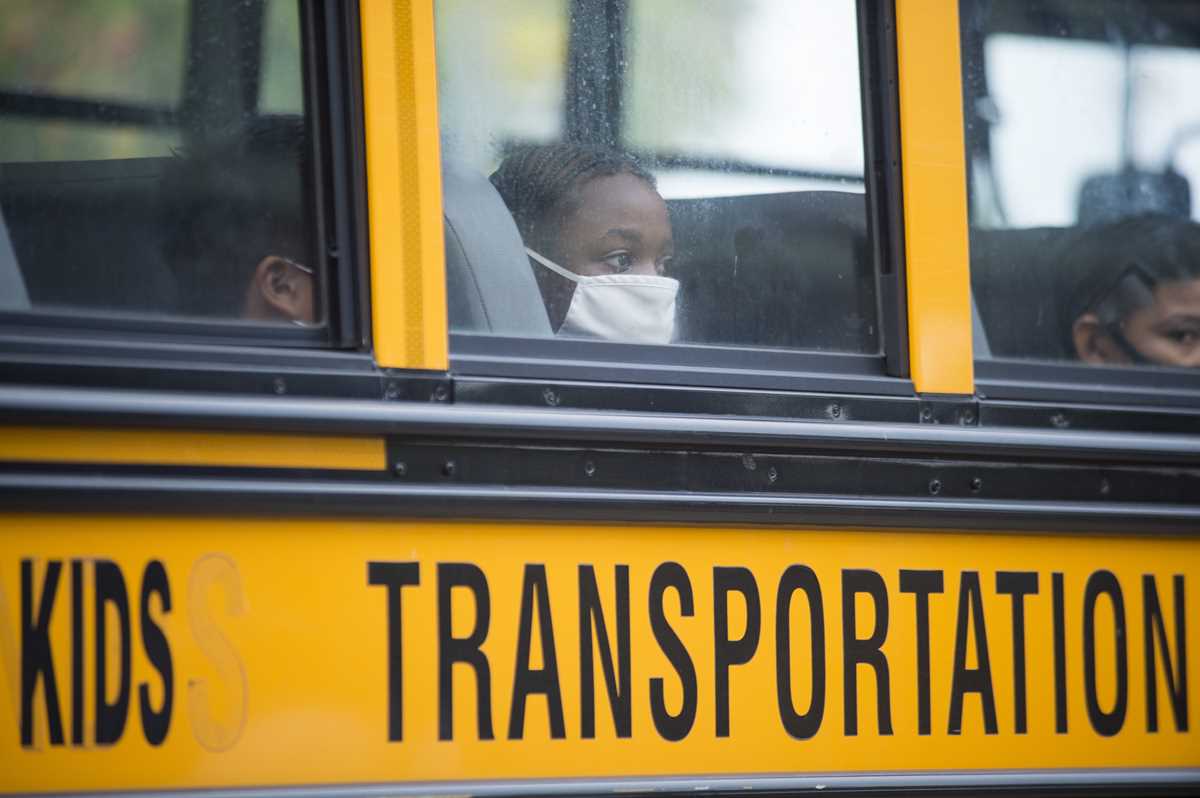 In this Oct. 12, 2020, file photo, students arrive by bus at Foundation Preparatory School for their return to school during the coronavirus in New Orleans. It was the first day of in-person learning for fifth-12th grade public school students in Orleans Parish. Despite climbing numbers of COVID-19 cases around Louisiana, state education leaders are leaving decisions on mask mandates, physical distancing and other measures aimed at lessening coronavirus spread to local public school districts for the upcoming year. (Chris Granger/The Times-Picayune/The New Orleans Advocate via AP, File)
In this Oct. 12, 2020, file photo, students arrive by bus at Foundation Preparatory School for their return to school during the coronavirus in New Orleans. It was the first day of in-person learning for fifth-12th grade public school students in Orleans Parish. Despite climbing numbers of COVID-19 cases around Louisiana, state education leaders are leaving decisions on mask mandates, physical distancing and other measures aimed at lessening coronavirus spread to local public school districts for the upcoming year. (Chris Granger/The Times-Picayune/The New Orleans Advocate via AP, File)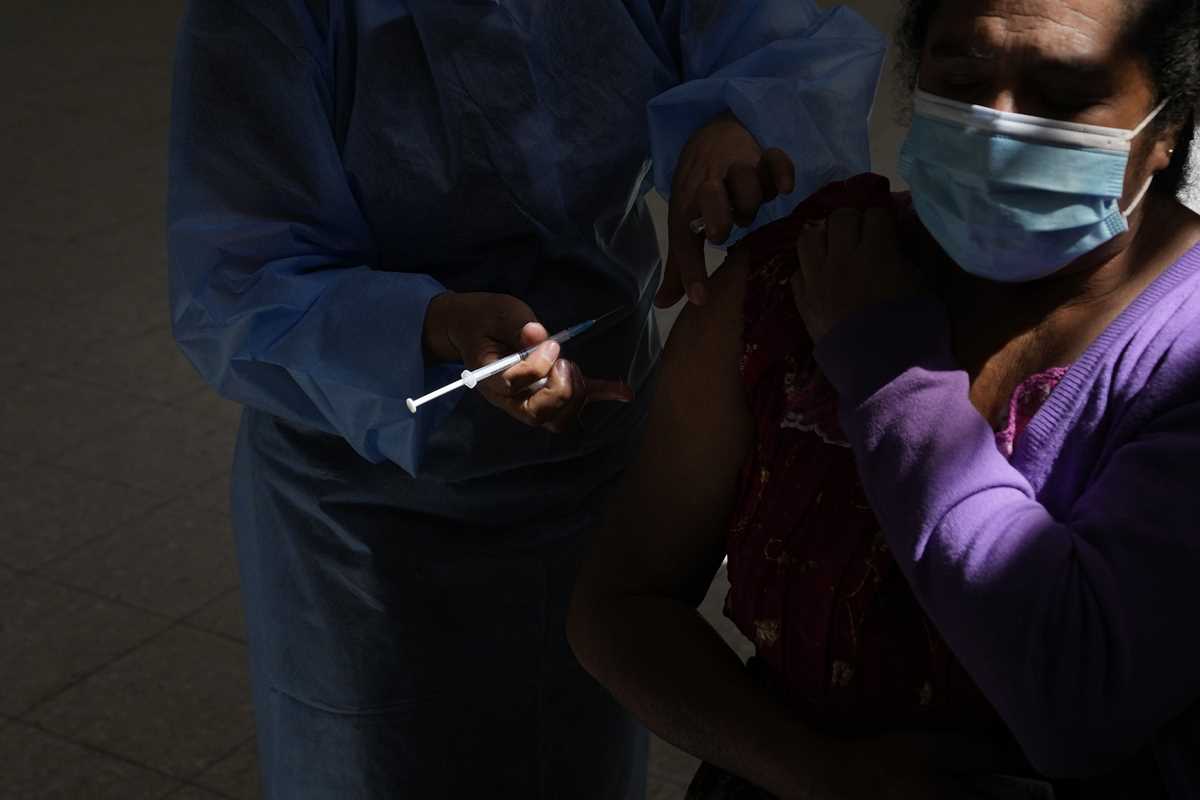 A healthcare worker gives a shot of the Moderna COVID-19 vaccine in San Juan Sacatepequez, Guatemala, Thursday, July 15, 2021. About 1.5 million doses of the Moderna vaccine have been donated by the United States. (AP Photo/Moises Castillo)
A healthcare worker gives a shot of the Moderna COVID-19 vaccine in San Juan Sacatepequez, Guatemala, Thursday, July 15, 2021. About 1.5 million doses of the Moderna vaccine have been donated by the United States. (AP Photo/Moises Castillo)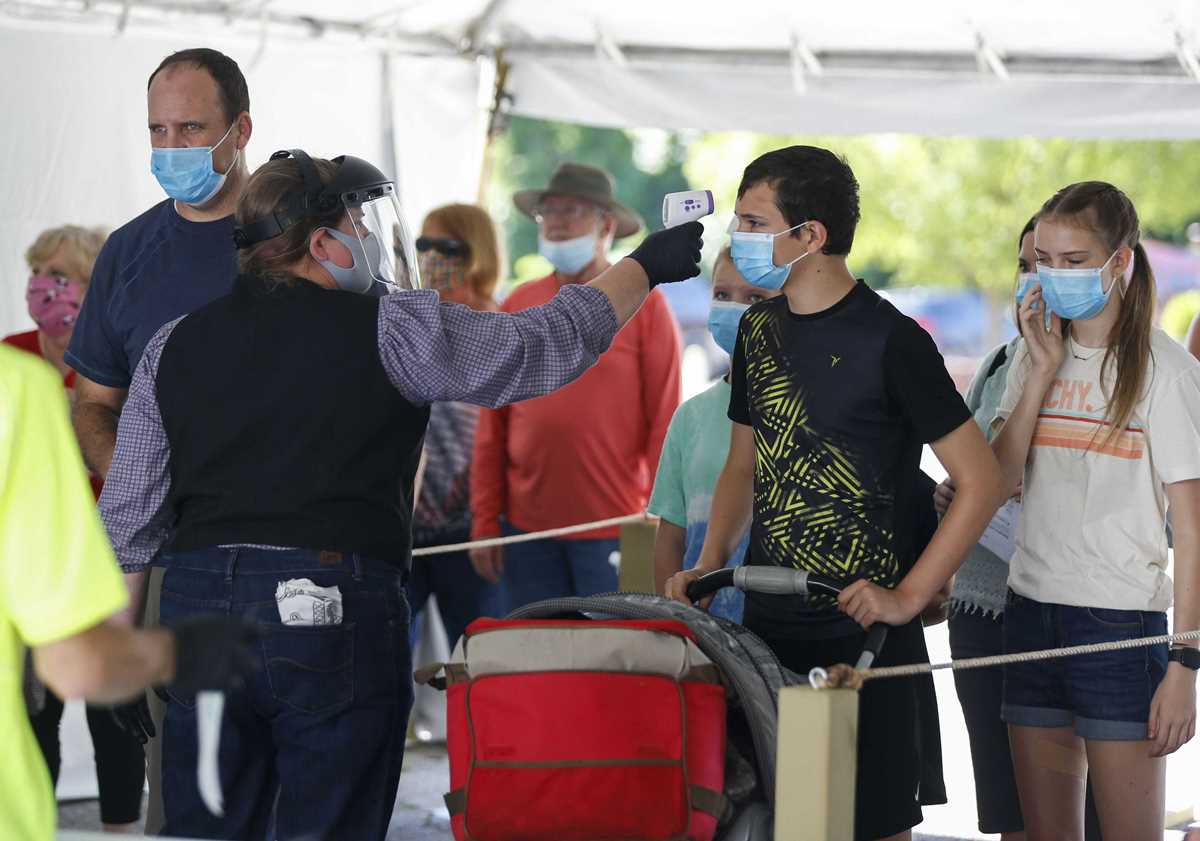 In this June 13, 2021, file photo, a Silver Dollar City employee takes the temperature of guests before they are allowed to enter the park just west of Branson, Mo. Missouri's health department is reporting the highest daily count of new COVID-19 cases since the dead of winter, and the association representing the state's hospital has warned that the health care system is potentially on the brink of a crisis. (Nathan Papes/The Springfield News-Leader via AP, File)
In this June 13, 2021, file photo, a Silver Dollar City employee takes the temperature of guests before they are allowed to enter the park just west of Branson, Mo. Missouri's health department is reporting the highest daily count of new COVID-19 cases since the dead of winter, and the association representing the state's hospital has warned that the health care system is potentially on the brink of a crisis. (Nathan Papes/The Springfield News-Leader via AP, File)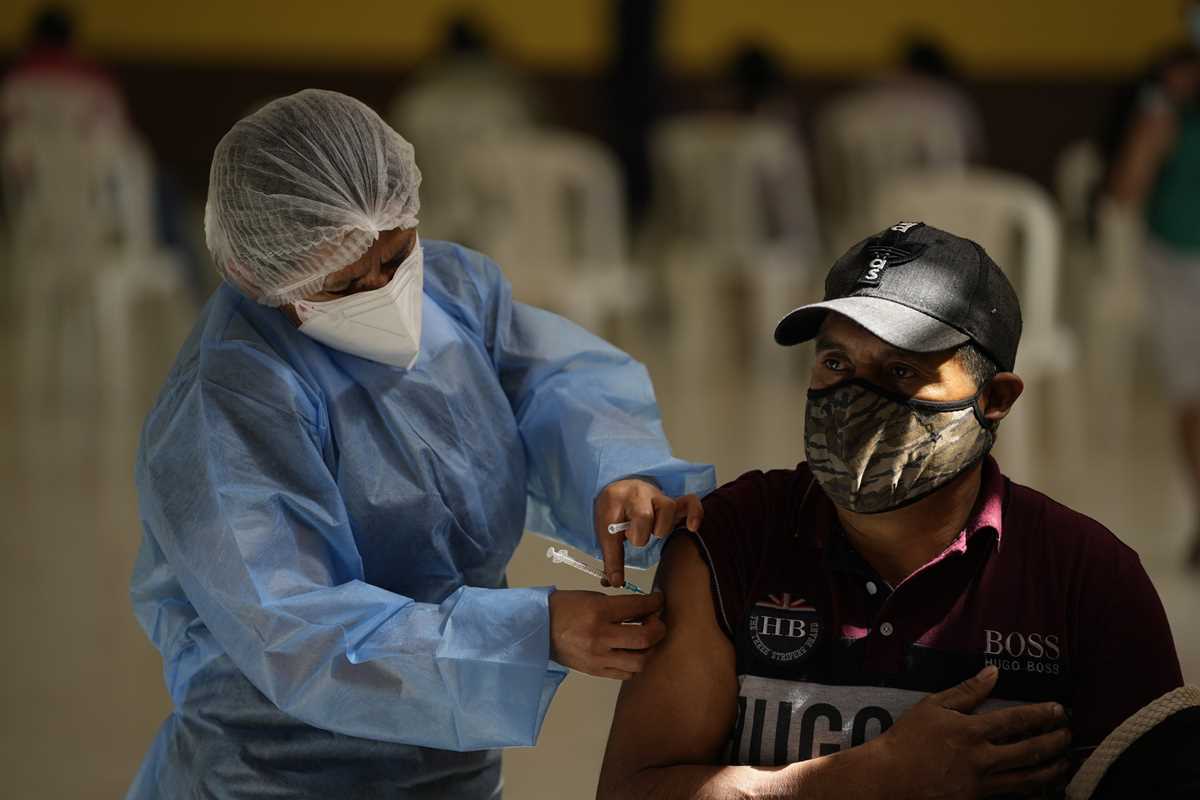 A healthcare worker administers a dose of the Moderna COVID-19 vaccine at a vaccination center in San Juan Sacatepequez, Guatemala, Thursday, July 15, 2021. About 1.5 million doses of the Moderna vaccine have been donated by the United States. (AP Photo/Moises Castillo)
A healthcare worker administers a dose of the Moderna COVID-19 vaccine at a vaccination center in San Juan Sacatepequez, Guatemala, Thursday, July 15, 2021. About 1.5 million doses of the Moderna vaccine have been donated by the United States. (AP Photo/Moises Castillo)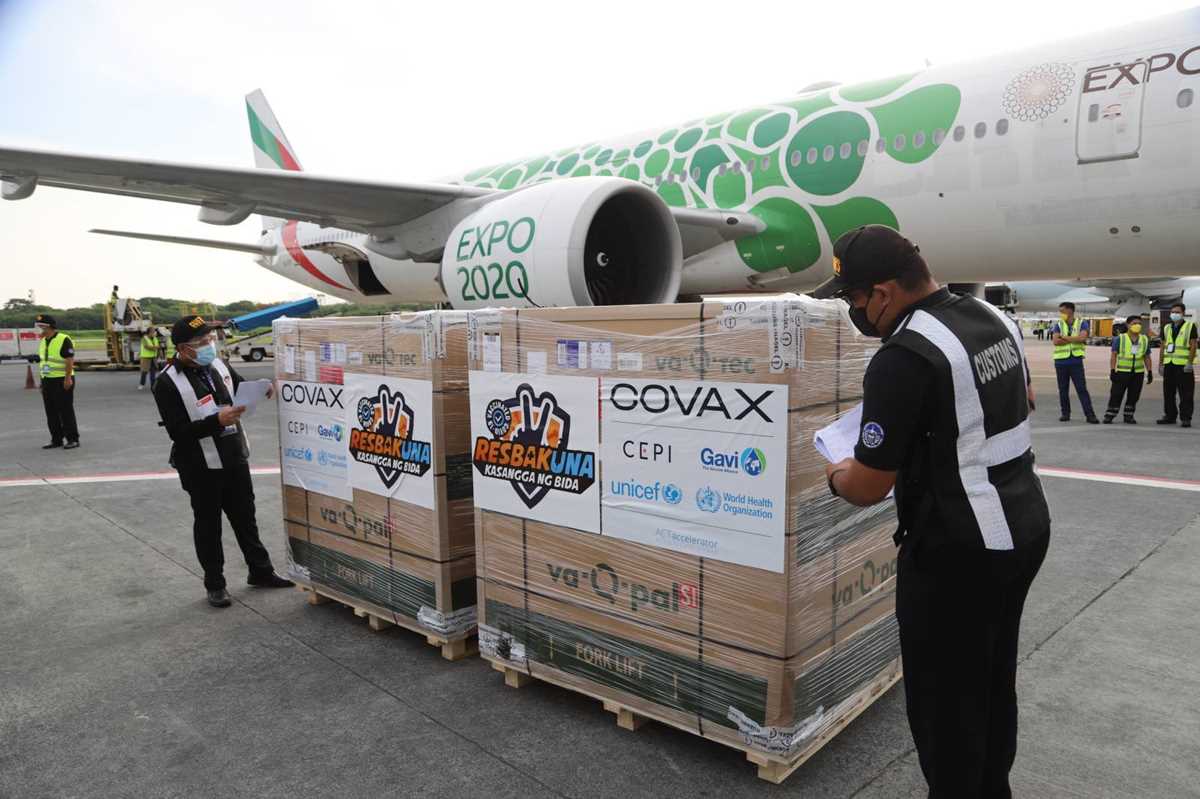 In this handout photo released by the National Task Force Against COVID19, workers check on the boxes containing Johnson & Johnson (J&J) vaccines as they arrive at Manila's International Airport, Philippines on Friday July 16, 2021. The first batch of vaccines consisting of 1,606,600 doses produced by American pharmaceutical firm Johnson & Johnson (J&J) and donated by the United States government through the COVAX facility have arrived in the country today. (National Task Force Against COVID19 via AP)
In this handout photo released by the National Task Force Against COVID19, workers check on the boxes containing Johnson & Johnson (J&J) vaccines as they arrive at Manila's International Airport, Philippines on Friday July 16, 2021. The first batch of vaccines consisting of 1,606,600 doses produced by American pharmaceutical firm Johnson & Johnson (J&J) and donated by the United States government through the COVAX facility have arrived in the country today. (National Task Force Against COVID19 via AP)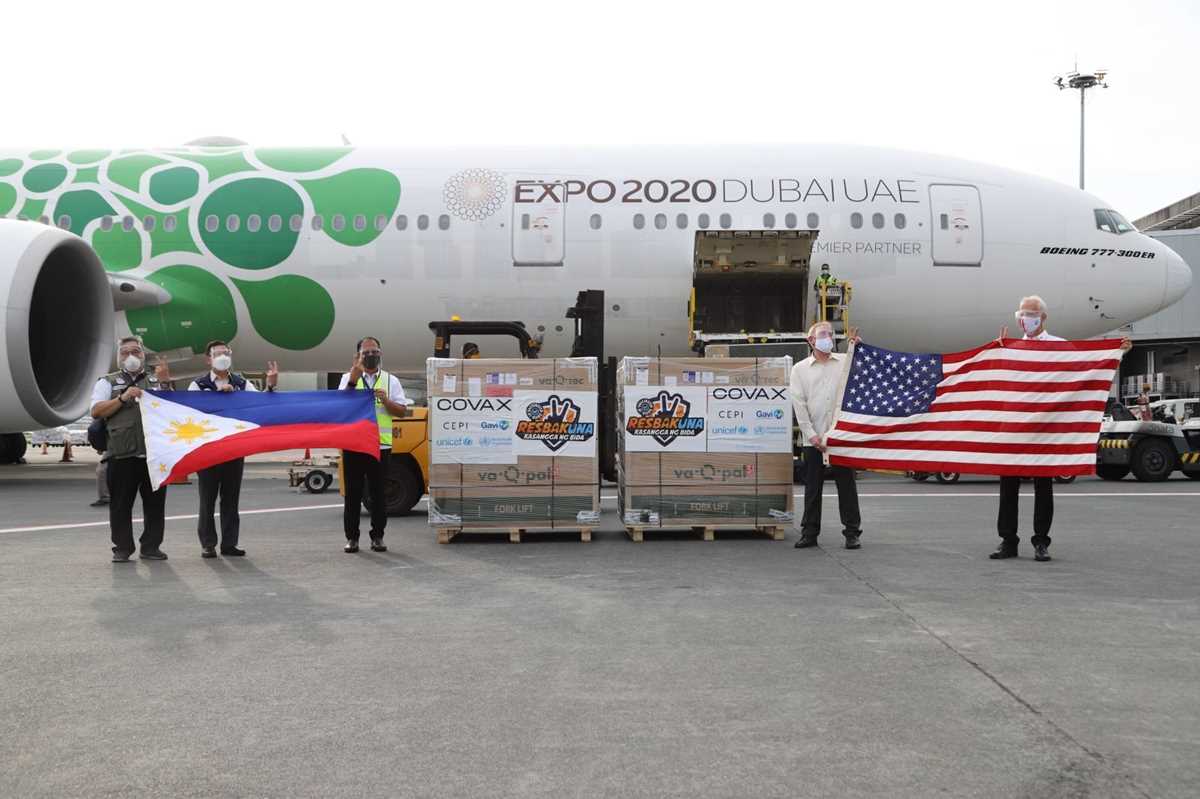 In this handout photo released by the National Task Force Against COVID19, US Embassy in the Philippines Chargé d'Affaires John C. Law, second from right, and Sean Callahan from US AID, right, holds a U.S. flag as Philippine vaccine czar Secretary Carlito Galvez Jr., center, and Health Secretary Francisco Duque II, second from left, hold the Philippine flag beside boxes containing Johnson & Johnson (J&J) vaccines as they arrive at Manila's International Airport, Philippines on Friday July 16, 2021. The first batch of vaccines consisting of 1,606,600 doses produced by American pharmaceutical firm Johnson & Johnson (J&J) and donated by the United States government through the COVAX facility have arrived in the country today. (National Task Force Against COVID19 via AP)
In this handout photo released by the National Task Force Against COVID19, US Embassy in the Philippines Chargé d'Affaires John C. Law, second from right, and Sean Callahan from US AID, right, holds a U.S. flag as Philippine vaccine czar Secretary Carlito Galvez Jr., center, and Health Secretary Francisco Duque II, second from left, hold the Philippine flag beside boxes containing Johnson & Johnson (J&J) vaccines as they arrive at Manila's International Airport, Philippines on Friday July 16, 2021. The first batch of vaccines consisting of 1,606,600 doses produced by American pharmaceutical firm Johnson & Johnson (J&J) and donated by the United States government through the COVAX facility have arrived in the country today. (National Task Force Against COVID19 via AP)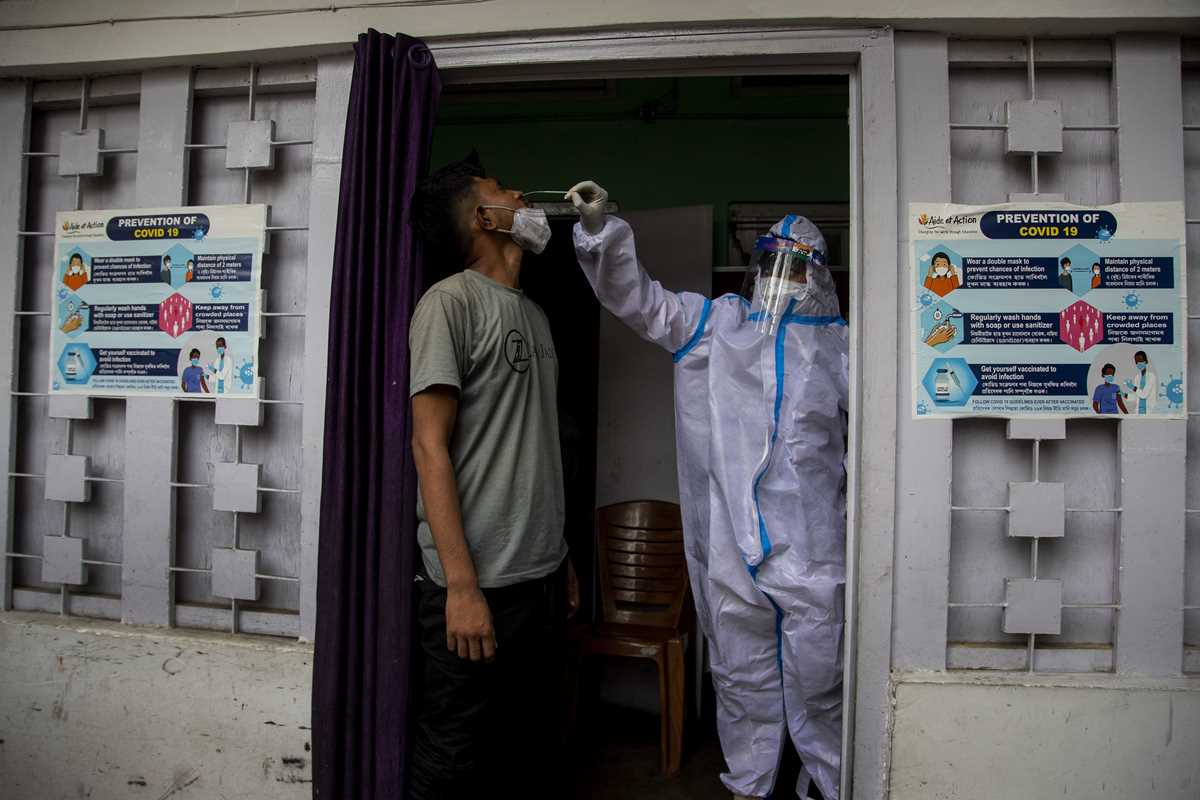 A health worker takes a nasal swab sample to test for COVID-19 in Gauhati, India, Friday, July 16, 2021. (AP Photo/Anupam Nath)
A health worker takes a nasal swab sample to test for COVID-19 in Gauhati, India, Friday, July 16, 2021. (AP Photo/Anupam Nath)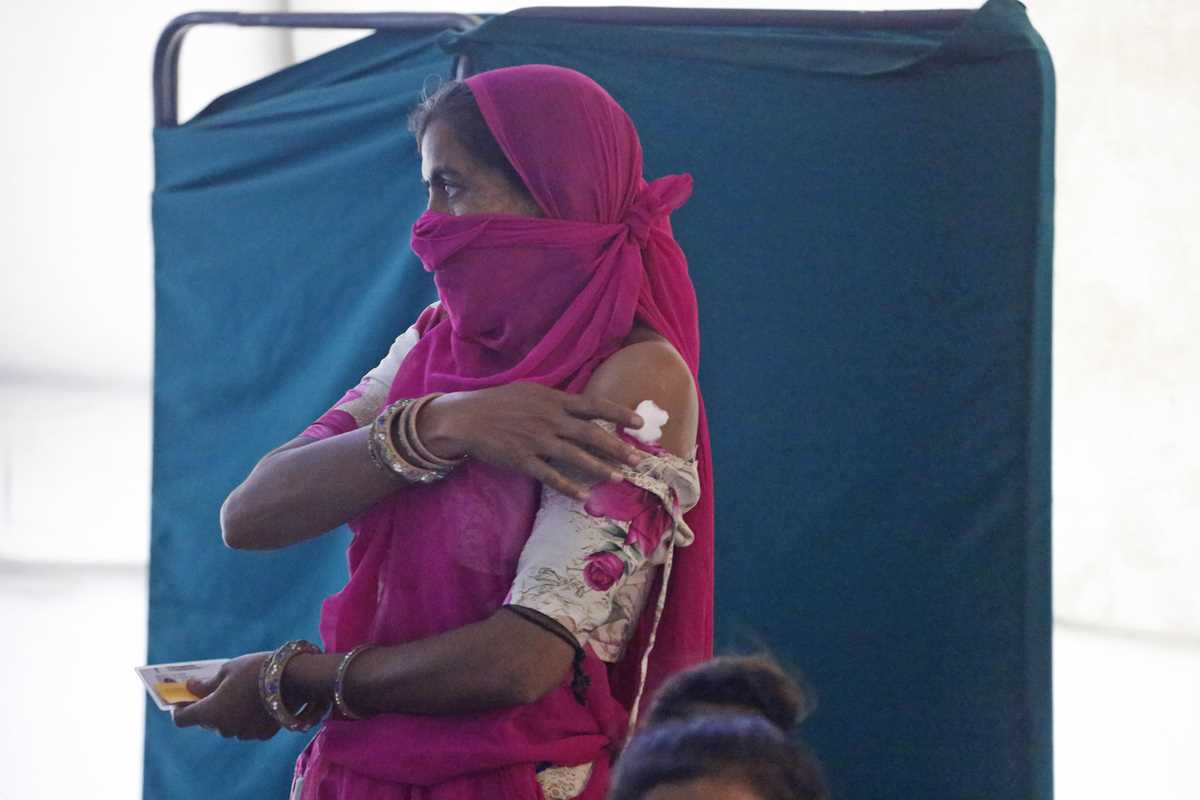 A woman stands after getting vaccinated for COVID-19 at a vaccination centre in Ahmedabad, India, Friday, July 16, 2021. (AP Photo/Ajit Solanki)
A woman stands after getting vaccinated for COVID-19 at a vaccination centre in Ahmedabad, India, Friday, July 16, 2021. (AP Photo/Ajit Solanki)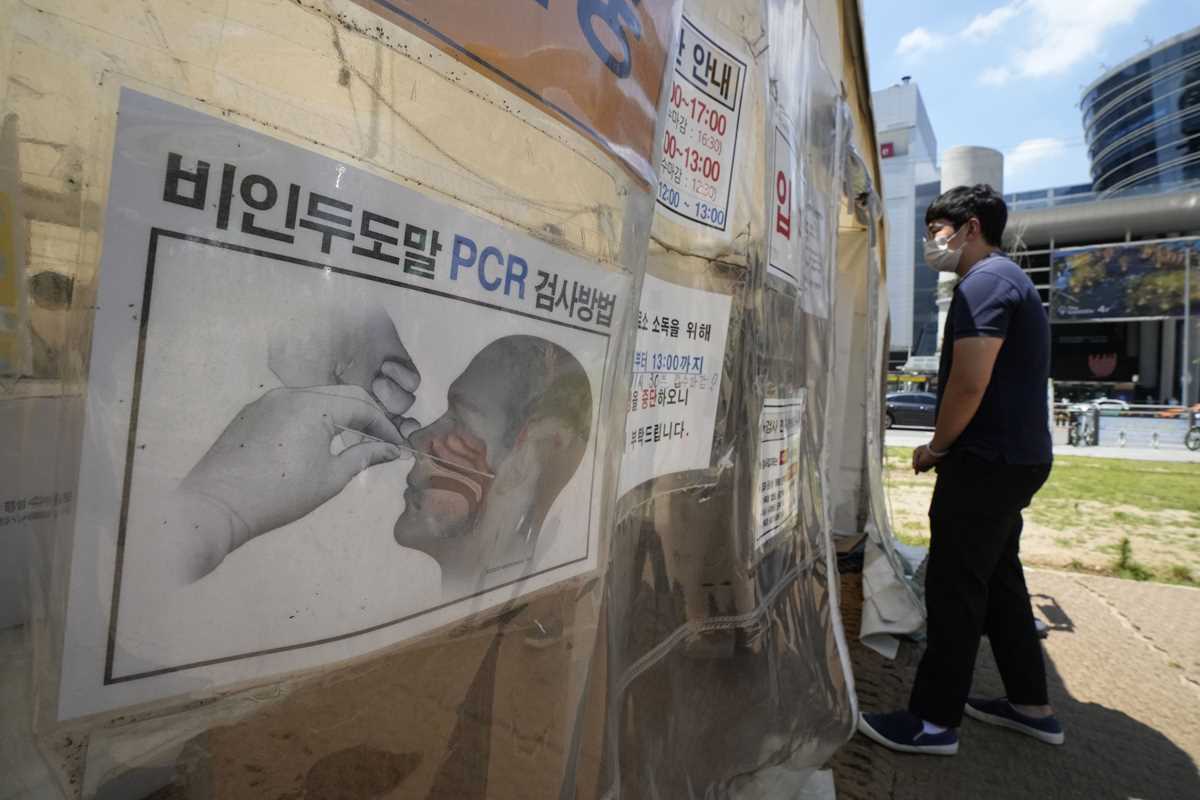 A man waits to get coronavirus testing at a makeshift testing site in Seoul, South Korea, Friday, July 16, 2021. South Korean officials are pushing for tightened pandemic restrictions beyond the hard-hit capital area as they wrestle with a record-breaking surge in coronavirus cases. The signs on a banner at left read "How to check Polymerase Chain Reaction." (AP Photo/Ahn Young-joon)
A man waits to get coronavirus testing at a makeshift testing site in Seoul, South Korea, Friday, July 16, 2021. South Korean officials are pushing for tightened pandemic restrictions beyond the hard-hit capital area as they wrestle with a record-breaking surge in coronavirus cases. The signs on a banner at left read "How to check Polymerase Chain Reaction." (AP Photo/Ahn Young-joon)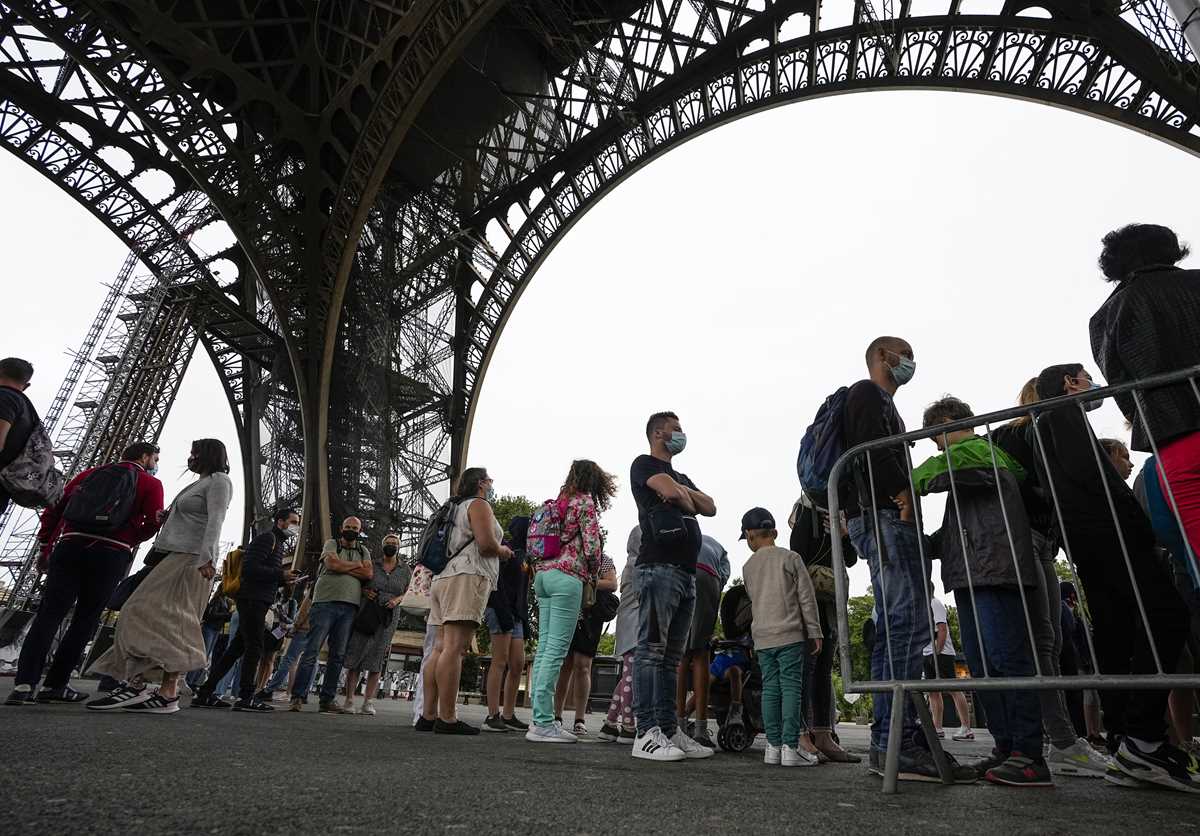 Visitor line up at the Eiffel Tower in Paris, Friday, July 16, 2021. The Eiffel Tower is reopening Friday for the first time in nine months, just as France faces new virus rules aimed at taming the fast-spreading delta variant. The "Iron Lady" was ordered shut in October as France battled its second surge of the virus. (AP Photo/Michel Euler)
Visitor line up at the Eiffel Tower in Paris, Friday, July 16, 2021. The Eiffel Tower is reopening Friday for the first time in nine months, just as France faces new virus rules aimed at taming the fast-spreading delta variant. The "Iron Lady" was ordered shut in October as France battled its second surge of the virus. (AP Photo/Michel Euler)NEW YORK — Pfizer announced U.S. regulators have agreed to a “priority review” of whether its COVID-19 vaccine should be fully approved, with a decision set for no later than January.
More than 186 million doses of the vaccine made by Pfizer and its German partner BioNTech have been administered in the U.S. alone since December. Many more doses have gone to other countries that have authorized emergency use of the vaccine during the pandemic.
Vaccines cleared for emergency use still must undergo the stringent full approval process, a step that might help persuade some people who aren’t yet immunized to roll up their sleeves.
The Food and Drug Administration’s January deadline is a formality. The decision could come far sooner given how closely the agency has been monitoring the vaccine’s widespread use.
Pfizer’s application, submitted in late May, includes the latest data from a large study that tracked participants 16 and older for six months after their second dose. The vaccine is given to people as young as 12, and Pfizer also intends to submit data needed for full approval in that age group.
___
MORE ON THE PANDEMIC:
— CDC leader: US in ‘pandemic of the unvaccinated’
— Russia hits another record daily virus deaths at 799
— Freedom or folly? UK’s end to mandatory masks sows confusion
— Two NFL teams remain under 50% vaccinated, AP learns
___
— Find more AP coverage at https://apnews.com/hub/coronavirus-pandemic and https://apnews.com/hub/coronavirus-vaccine
___
HERE’S WHAT ELSE IS HAPPENING:
WASHINGTON — The White House says it’s in no hurry to lift COVID-19 international travel restrictions, a day after President Joe Biden said he hoped to have an updated timeline for easing them.
Speaking during a White House briefing, COVID-19 coordinator Jeff Zients said: “We must remain vigilant, particularly about the spread of variants and we’ll reopen when the medical folks and health experts believe it’s safe to do so.”
Zients adds any decision about opening international travel will be guided by a review of coronavirus cases, vaccination rates and virus variants.
European allies have chaffed at the restrictions, given in some places their vaccination and case rates are better than the U.S., and other parts of the world are not subject to the stiff entry requirements. German Chancellor Angela Merkel pressed Biden on the matter Thursday during their Oval Office meeting.
___
WASHINGTON — The director of the Centers for Disease Control and Prevention says the COVID-19 outbreak in the U.S. is becoming “a pandemic of the unvaccinated.”
Speaking during a White House briefing, Dr. Rochelle Walensky says cases in the U.S. are up about 70% over the last week, hospital admissions are up 36% and deaths rose by 26%. Nearly all hospital admissions and deaths, she says, are among the unvaccinated.
White House COVID-19 coordinator Jeff Zients echoed the pandemic is “one that predominantly threatens unvaccinated people.”
He says the Biden administration expects cases to increase in the weeks ahead because of spread in communities with low vaccination rates. Four states accounted for 40% of new cases last week, with one in five coming from Florida.
But Zients says there are signs that increased cases are driving more people in those communities to seek vaccination at rates faster than the national average.
___
TOKYO — Japan’s top medical adviser for Prime Minister Yoshihide Suga’s government urged authorities to step up virus measures ahead of the Olympics and asked the people to avoid trips.
Tokyo registered 1,271 new cases Friday, the day after recording a six-month high of 1,308.
Dr. Shigeru Omi, who heads a government COVID-19 taskforce, says the next two months will be the “most crucial stage” in Japan’s fight against the pandemic. He urged people to watch the Olympics on TV at home with family members or close friends in small groups.
Omi says the ongoing upsurge in the Tokyo region is likely to accelerate, with the summer vacation, the Olympics and the Buddhist holiday week in August when people are likely to travel.
Prime Minister Yoshihide Suga last week declared a fourth state of emergency in Tokyo, which started Monday and lasts until Aug. 22. Nationwide, Japan has reported 830,000 cases and 15,000 confirmed deaths.
___
PARIS — The Eiffel Tower is reopening for the first time in nine months even though France is under new rules aimed at taming the delta variant.
This week, President Emmanuel Macron announced COVID-19 passes would be required to enter restaurants and venues such as the Eiffel Tower. Starting Wednesday, all visitors over 18 will need to show a pass proving they’ve been fully vaccinated, had a negative virus test or recently recovered from COVID-19.
The “Iron Lady” of Paris was ordered shut in October as France contended with its second virus surge of the pandemic. The tower stayed shut for renovations after most of the major tourist draws reopened last month.
___
MOSCOW — Daily coronavirus deaths in Russia have hit another record, with the authorities reporting 799 deaths. It’s the fourth straight day of record number of deaths.
On Friday, officials reported 25,704 new coronavirus cases. Daily new infections in Russia have soared from around 9,000 in early June to more than 25,000 last week.
Officials blamed the surge on the spread of the delta variant and a sluggish vaccine uptake that has remained lower than in many Western countries. As of Tuesday, 28.6 million Russians -- or just 19.5% of the 146 million population -- have received at least one shot of a vaccine.
Russia’s state coronavirus task force has reported more than 5.9 million confirmed coronavirus cases and a total of 146,868 confirmed deaths in the pandemic. However, reports by Russia’s state statistical service Rosstat, which tallies coronavirus-linked deaths retroactively, reveal much higher numbers.
___
LONDON — The British government’s top medical adviser has warned that number of people in hospital with the coronavirus could reach “quite scary” levels within weeks as cases soar from the delta variant and the lifting of lockdown restrictions.
Professor Chris Whitty spoke on a webinar hosted by London’s Science Museum, saying the U.K. is “not out of the woods yet.” His comments came in the wake of government figures showing that coronavirus infections have struck another six-month high and the number of people in hospital with COVID-19 and subsequently dying are at their highest level since March.
There were 3,786 people in hospital with COVID-19 and another 63 virus-related deaths reported Thursday. Another 48,553 confirmed lab cases were reported Thursday, the biggest daily figure since Jan. 15. The government has stated that daily infections could hit 100,000 this summer.
At the height of the second wave earlier this year, some 40,000 people were in hospital with COVID-19 and deaths reached 1,500 people a day.
___
ISLAMABAD — Pakistan’s planning minister asked countrymen to avoid gatherings during the upcoming Eid al-Adha holiday to help contain the spread of coronavirus.
Asad Umar also urged people to get vaccinated for their own safety and avoid becoming a source of the spread. He says the people who avoided the COVID-19 vaccine for any reason were risking their life apart from becoming a danger to their loved ones.
He says unvaccinated people won’t be allowed to visit tourist sites before and after Eid al-Adha or feast of sacrifice, which begins in Pakistan next week. Umar made these comments at a news conference amid a surge in COVID-19 cases and deaths.
Pakistan reported 31 new deaths and 2,327 new cases in the past 24 hours. That brings the totals to 22,720 confirmed deaths and 983,719 confirmed cases.
___
MOSCOW — Authorities in the Russian capital have walked back on their order for restaurants to only admit customers who have been vaccinated against the coronavirus or could produce a negative test.
The decision announced Friday by Moscow Mayor Sergei Sobyanin becomes effective Monday. It retracts the measure that has been in place since late June, obliging restaurants and cafes to check. Sobyanin argued that the city officials were able to revise the decision because the pace of contagion has slowed down.
___
BUDAPEST, Hungary - Hungary’s government will provide citizens with the option to receive a third dose of COVID-19 vaccine beginning in August, Prime Minister Viktor Orban said on Friday.
The third shot will be made available to all people regardless of age, health or which vaccine they received initially, Orban said in an interview with public radio. The government recommends, but does not require, the third dose to be administered at least four months following the second, and doctors may choose whether to provide patients with a different vaccine than previously received.
“There is no reason to fear a third vaccine dose. If people don’t have to fear it and their sense of security is increased if they receive it, then why would we keep them from this option?” Orban said.
Hungary is the latest country to offer booster shots amid concerns that some jabs do not provide full protection from COVID-19 to all recipients. In May, the United Arab Emirates and Bahrain announced they would offer third shots to some people who received China’s Sinopharm following concerns over insufficient development of antibodies, which protect against the virus.
In Hungary, which also uses the Sinopharm vaccine, some have also expressed worry that they are not fully protected from COVID-19, and have demanded third doses.
___
COLOMBO, Sri Lanka — Sri Lanka has received 1.5 million doses of the Moderna vaccine from the U.S. through the U.N.-backed COVAX facility.
It was the second shipment to Sri Lanka from the global COVAX effort after an AstraZeneca delivery in March.
Sri Lanka has given 36% of its population their first vaccine dose while 13% have received both doses.
Its vaccination campaign was set back by halted shipments of AstraZeneca from the Indian producer. It then turned to Sinopharm, Sputnik V and Pfizer to get its population inoculated.
Sri Lanka has confirmed 279,059 coronavirus infections with 3,611 fatalities.
___
TORONTO — Prime Minister Justin Trudeau said on Thursday Canada could start allowing fully vaccinated Americans into Canada as of mid-August for non-essential travel and should be in a position to welcome fully vaccinated travelers from all countries by early September.
Trudeau spoke with leaders of Canada’s provinces and his office released a readout of the call. He noted that if Canada’s current positive path of vaccination rate and public health conditions continue the border can open.
“Canada would be in a position to welcome fully vaccinated travelers from all countries by early September,” the readout said. “He noted the ongoing discussions with the United States on reopening plans, and indicated that we could expect to start allowing fully vaccinated U.S. citizens and permanent residents into Canada as of mid-August for non-essential travel.”
Trudeau noted Canada continues to lead G20 countries in vaccination rates with approximately 80% of eligible Canadians receiving one dose and over 50% of eligible Canadians fully vaccinated. He said case numbers and severe illness continue to decline.
____
SEOUL, South Korea – South Korean officials are pushing for tightened pandemic restrictions beyond the hard-hit capital area as they wrestle with a record-breaking surge in coronavirus cases.
Prime Minister Kim Boo-kyum during a virus meeting Friday called for all local governments outside the greater Seoul area to simultaneously enforce four-person limits on gatherings after 6 p.m. to slow the viral spread.
Permitted social bubbles are even smaller in Seoul and nearby Gyeonggi province and Incheon, where officials are enforcing the strongest “Level 4” restrictions that prohibit gatherings of three or more people after 6 p.m., ban visitors at hospitals and nursing homes, and shut down nightclubs and churches.
Lee Ki-Il, deputy minister of health care policy at South Korea’s Health Ministry, said national government officials will discuss Kim’s proposal with local governments and could announce a decision over the weekend.
The Korea Disease Control and Prevention Agency reported another new 1,536 coronavirus cases, the 10th straight day of over 1,000. The country’s caseload is now at 175,046, including 2,051 deaths.
——
Before you make your next trade, you'll want to hear this.
MarketBeat keeps track of Wall Street's top-rated and best performing research analysts and the stocks they recommend to their clients on a daily basis.
Our team has identified the five stocks that top analysts are quietly whispering to their clients to buy now before the broader market catches on... and none of the big name stocks were on the list.
They believe these five stocks are the five best companies for investors to buy now...
See The Five Stocks Here
Looking to generate income with your stock portfolio? Use these ten stocks to generate a safe and reliable source of investment income.
Get This Free Report